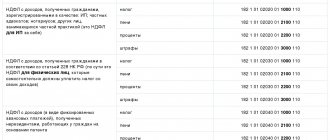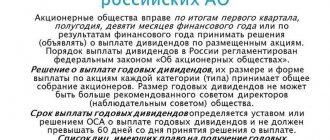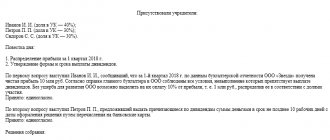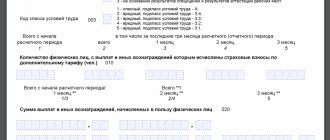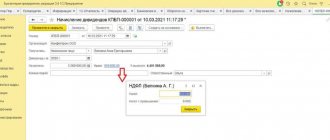Kontur.Accounting - the optimal service for the simplified tax system
Automated calculation of taxes and transactions with employees.
The simplest accounting possible. The service itself will generate KUDiR, declaration and reports. Try for free
The founders of the organization distribute profits and pay dividends every year. LLCs using the simplified tax system distribute profits in the general manner, but the calculation and payment of dividends using the simplified system have their own peculiarities. In this article we will tell you how to calculate and pay dividends using the simplified tax system.
What income is recognized as dividends?
Every year, companies, if their performance results are positive, distribute the profits received among persons owning shares or shares.
Most often, this is done in the form of dividends, and the decision on their size and timing of payments is made by the general meeting. Such a meeting may be annual or extraordinary; for joint stock companies this is a meeting of shareholders (clause 1 of article 47, subclause 10.1, 11 of clause 1 of article 48 of the law “On joint stock companies” dated December 26, 1995 No. 208-FZ, hereinafter referred to as law No. 208-FZ), and for an LLC - a meeting of participants (clause 1 of Article 28, subclause 7 of clause 2 of Article 33 of the Law “On Limited Liability Companies” dated 02/08/1998 No. 14-FZ, hereinafter referred to as Law No. 14-FZ).
According to paragraph 1 of Art. 43 of the Tax Code of the Russian Federation, a dividend is any income of a participant or shareholder if it is received from the company during the distribution of net profit in an amount proportional to the share in the authorized capital.
If a company received income from sources located outside of Russia, and such income falls within the definition of dividends in that country, then it will be recognized as a dividend in the Russian Federation.
In addition, dividends are recognized in accordance with clause 6 of Art. 269 of the Tax Code of the Russian Federation, and excess interest paid by a resident of the Russian Federation to a foreign company on controlled debt.
Source of LLC dividends
Dividends (or income from the use of net profit) are income the receipt of which is available to LLC participants (Clause 1, Article 28 of the Law “On LLC” dated 02/08/1998 No. 14-FZ).
Accordingly, to issue such income, it is necessary, first of all, to have net profit. It is determined according to accounting data (letter of the Ministry of Finance of the Russian Federation dated September 20, 2010 No. 03-11-06/2/147). The LLC has the opportunity to choose the frequency of dividend payments to the founders: quarterly, half-yearly or annually - depending on the amount of net profit for each of these periods. Considering that profit is considered an accrual total for the year, its final amount will be known at the end of the tax period, and only then will it be possible to establish the final amount of income possible for payment. Therefore, in order to avoid situations where dividends paid during the year exceed the permissible amount for the year, it is better to distribute them at the end of the year based on the results of the approved annual accounting reports.
ATTENTION! The tax base for income in the form of dividends is determined for each payment separately (clause 3 of Article 214 of the Tax Code of the Russian Federation). Therefore, we believe that even if at the end of the year the organization receives a loss or its net profit turns out to be less than the amount of interim dividends paid, there is no need to change their qualification for tax purposes.
To learn about the cases in which LLC accounting may have a simplified form, read the material “Simplified accounting statements for small enterprises for 2021.”
Should payments from the net profit of previous years be recognized as dividends?
Payments from the profits of previous years, in all likelihood, can also be classified as dividends. The fact is that the legislation (tax and civil) does not contain a ban on the issuance of dividends from past profits (Article 43 of the Tax Code of the Russian Federation, Article 28 of Law No. 14-FZ, Article 42 of Law No. 208-FZ).
The regulatory authorities in their explanations also adhere to this point of view. Confirmation is contained in letters from the Ministry of Finance of Russia dated 03/20/2012 No. 03-03-06/1/133, dated 04/06/2010 No. 03-03-06/1/235 and the Federal Tax Service of Russia for Moscow dated 06/08/2010 No. 16-15 / [email protected] , dated June 23, 2009 No. 16-15/063489.
The Ministry of Finance clarifies that such payments are considered dividends if one condition is met: the net profit was not sent to the reserve fund or the employees' corporatization fund. And the tax service believes that such a procedure for distributing profits should be reflected in the company’s charter.
However, if you look at the previous explanations of the financial department, you will find some inconsistency there. Thus, the Ministry of Finance in letters dated 06/17/2010 No. 03-03-06/1/415, dated 03/17/2008 No. 03-04-06-01/60 and dated 02/06/2008 No. 03-03-06/1/83 approves that such issues are not his competence. And the letter dated 08/23/2002 No. 04-02-06/3/60 states that if an organization needs to pay dividends, then this can only be done at the expense of profits generated in the just past tax period.
Judicial practice shows: arbitrators are in favor of paying dividends from past profits (resolutions of the FAS North Caucasus District dated January 23, 2007 No. F08-7128/2006, FAS East Siberian District dated August 11, 2005 No. A33-26614/04-S3- Ф02-3800/05-С1). That is, the decisions contain indirect confirmation: such dividends should be taxed.
Read in this material how accounting policies are structured under the simplified tax system.
When is a dividend payment transaction invalidated?
If dividends were paid during the period of insolvency of the company, then such a transaction may be declared invalid. After all, such a transaction entails the possibility of causing harm to the rights and interests of the debtor’s creditors (clause 5 of the Plenum of the Supreme Arbitration Court of the Russian Federation No. 63 of December 23, 2010).
For example, after partial payment of dividends, the participants filed an application to withdraw from the company, and subsequently filed a demand for recovery of the actual value of the share. The transactions were completed in the presence of unfulfilled obligations to creditors during the bankruptcy period. The payment of dividends caused harm to the rights and interests of the debtor’s creditors, and therefore the decision to pay dividends was declared void by a judicial act that entered into force (Resolution of the Volga District Court of June 11, 2019 No. A55-6826/2017).
What payments are not considered dividends?
According to paragraph 2 of Art. 43 of the Tax Code of the Russian Federation the following payments are not dividends:
- amounts paid to a participant or shareholder of a company in connection with the liquidation of an organization, in an amount proportional to the contribution to the authorized capital;
- shares transferred into the ownership of a participant or shareholder;
- contributions to a non-profit organization made by a business company for the statutory activities of the organization.
Summarizing all of the above, we can derive 2 characteristics that allow us to recognize payments as dividends:
- payments are made from the organization’s net profit;
- payments are made in direct proportion to the size of the participant’s or shareholder’s share in the company’s capital.
Example
The Omega organization has accumulated additional capital, which it decided to distribute. Among the society's participants is the organization "Sigma", which is owed a certain amount.
The amount paid does not have the characteristics given above, therefore it has nothing to do with dividends. This income should be taxed at the normal rate of 20%. Confirmation of this thesis can be found in the letter of the Federal Tax Service of Russia for Moscow dated July 3, 2008 No. 20-12/ [email protected]
What is needed to pay dividends
In order for an organization to distribute net profit among the founders, a number of conditions must be met. Let's list the main ones:
- the organization has profit remaining after taxation. In case of losses, dividends cannot be paid;
- the authorized capital is fully paid;
- the value of net assets is greater than or equal to the authorized capital. Net assets refer to the difference between an organization's assets and its debts. Net assets are capital and reserves (indicated in the final line of section III of the balance sheet), increased by deferred income (indicated in line 1530 of the balance sheet) and reduced by the debt of participants to pay the management company (indicated in line 1170 of the balance sheet).
- the organization has no signs of bankruptcy.
Fill out and print your balance sheet using the current form for free
Accrual and payment of dividends under the simplified tax system “income” and “income minus expenses”
The calculation of dividends under the simplified tax system, as well as under the general regime, is made in direct proportion to the share (contribution) of the participant, and payment is made minus the tax withheld from accrued income.
Any organization paying dividends, in accordance with clause 3 of Art. 214, paragraph 1, art. 226, paragraph 2 of Art. 226.1, paragraphs. 3, 7 tbsp. 275 of the Tax Code of the Russian Federation, becomes a tax agent. Moreover, the responsibilities for calculating and paying income tax on accrued dividends must be fulfilled, including by organizations that apply the simplified tax system (subclause 1, clause 3, article 24, subclauses 3, 5, 7, article 275, clause 5, art. 346.11 Tax Code of the Russian Federation). The selected simplified taxation object does not affect the calculation of dividends and the calculation of income tax on them.
To learn how income tax on dividends is calculated, read the material “How to correctly calculate income tax on dividends?” .
Next, we will consider some cases in which an organization using the simplified tax system acts as a tax agent when paying dividends to other organizations and individuals.
If the legal entity that receives dividends uses the general taxation system, then the organization that made the payments must calculate, withhold and transfer income tax to the budget. This obligation is determined by the provisions contained in sub-clause. 1 clause 3 art. 24, pp. 3, 5, 7 tbsp. 275 Tax Code of the Russian Federation.
When you also have to pay income tax under the simplified tax system, you can find out from the material “Income tax under the simplified tax system (nuances)” .
Dividend distribution
If there is a single founder, the issue of distribution does not arise. He receives the entire amount allocated for payment purposes.
If there are several participants, the distribution will most often be proportional to the share of the contribution to the management company. The amount of dividends per person is determined by multiplying the total amount allocated for distribution by the percentage reflecting the share of participation.
If the distribution does not correspond to the proportion or algorithm established by the charter, then in relation to payments to individuals this may lead to disputes with extra-budgetary funds, which are not accrued on the amount of legally paid dividends. And the amounts in excess will be considered ordinary income, for which these accruals are required.
What to pay attention to when distributing the net profit of an enterprise, read the article “What is the procedure for distributing net profit (nuances)?”
We transfer dividends to an LLC using the simplified tax system: features
Moreover, even if the organization receiving the dividends is also in a special regime (STS, Unified Agricultural Tax), then income tax on the amount of dividends must still be paid. For recipients on the simplified tax system and unified agricultural tax, this conclusion follows from the provisions of clause 3 of art. 284, paragraph 3 of Art. 346.1, paragraph 2 of Art. 346.11 Tax Code of the Russian Federation.
It is noteworthy that for dividend recipients - organizations that use different objects of taxation - “income” and “income minus expenses”, the tax is also calculated using a single methodology.
ConsultantPlus experts explained step by step how to take into account dividends received when calculating tax on the simplified tax system. To do everything correctly, get trial access to the system and go to the Ready solution. It's free.
How to calculate dividends under the simplified tax system if the recipient is an individual
An organization using the simplified tax system that pays dividends to an individual is considered a tax agent, and according to subclause. 1 clause 3 art. 24, paragraph 3, art. 214, paragraph 1, art. 226, paragraph 2 of Art. 226.1 of the Tax Code of the Russian Federation, the responsibility for calculating, withholding and introducing personal income tax into the budget is assigned.
For information on the procedure for collecting personal income tax on dividends, read the material “Is personal income tax collected on dividends?” .
It is noteworthy that this is a rare case when a tax agent must pay personal income tax even for an individual entrepreneur using the simplified tax system, PSN or unified agricultural tax. The fact is that individual entrepreneurs are in special modes, in accordance with paragraph 3 of Art. 346.1, paragraph 3 of Art. 346.11 of the Tax Code of the Russian Federation, dividends are not exempt from income tax.
Accounting and taxation of dividends. Founding organizations using the simplified tax system
Legal entities applying the simplified tax system may own shares (interests) in other enterprises and, accordingly, receive income from participation in other organizations. Such income, in particular, includes the amount of part of the profit (dividends) distributed in favor of the organization.
Let's consider the procedure for reflecting income from participation in other organizations, as well as the peculiarities of taxation of this income in the accounting of the founding organization using the simplified tax system.
Let us note that the application of the simplified tax system by founding organizations provides for their exemption from the obligation to pay corporate income tax (with the exception of tax paid on income taxed at the tax rates provided for in paragraphs 3 and 4 of Article 284 of the Tax Code of the Russian Federation), property tax of organizations .
Founding organizations that apply the simplified tax system are also not recognized as payers of VAT, with the exception of VAT payable when importing goods into the territory of the Russian Federation and other territories under its jurisdiction, as well as VAT paid in accordance with Art. 174.1 of the Tax Code of the Russian Federation (clause 2 of Article 346.11 of the Tax Code of the Russian Federation).
In accordance with paragraph 1 of Art. 43 of the Tax Code of the Russian Federation, a dividend is any income received by a shareholder (participant) from an organization during the distribution of profits remaining after taxation (including in the form of interest on preferred shares) on shares (stakes) owned by the shareholder (participant) in proportion to the shares of shareholders (participants) in the authorized (share) capital of this organization.
The decision to pay dividends, the payment procedure, as well as their amount are determined in accordance with the norms of tax legislation, as well as in accordance with federal laws governing the activities of individual organizational and legal forms.
For example, the payment of dividends by joint stock companies is regulated by Chapter 5 “Company Dividends” of the Federal Law of December 26, 1995 No. 208-FZ “On Joint Stock Companies”.
Federal Law No. 14-FZ of February 8, 1998 “On Limited Liability Companies” (hereinafter referred to as Law No. 14-FZ) does not contain such a concept as a dividend. Article 28 of Law No. 14-FZ establishes that a company has the right to decide on the distribution of its net profit among its participants. Part of the profit intended for distribution among the company's participants is distributed in proportion to their shares in the authorized capital of the company.
Dividend accounting
For the purposes of accounting of the founding organization applying the simplified tax system, dividends received are other income for the organization on the basis of clause 7 of the Accounting Regulations “Income of the organization” PBU 9/99, approved by order of the Ministry of Finance of Russia dated May 6, 1999 No. 32n (hereinafter – PBU 9/99).
In accordance with clause 16, paragraphs. “a”, “b” and “c” clause 12 of PBU 9/99, recognition of dividends in accounting is carried out on the date of the decision on the payment of dividends by the general meeting of shareholders (participants) of the issuing organization.
The chart of accounts for the financial and economic activities of an organization and the Instructions for its application, approved by order of the Ministry of Finance of Russia dated October 31, 2000 No. 94n (hereinafter referred to as the Chart of Accounts), provides for a subaccount to summarize information on income from participation in the authorized capitals of other organizations 3 “Calculations for due dividends and other income” of account 76 “Settlements with various debtors and creditors”.
The accrual of income from the organization's participation in the authorized capitals of other organizations is reflected in the organization's accounting records on the credit of account 91 "Other income and expenses", subaccount 1 "Other income", and the debit of account 76 "Settlements with various debtors and creditors", subaccount 3 "Settlements for dividends and other income due."
The actual receipt of dividends is reflected by the entry:
Debit of accounts 51 “Settlement accounts” (50 “Cash”, 52 “Currency accounts”), Credit of account 76 “Settlements with various debtors and creditors”, subaccount 3 “Settlements for due dividends and other income” - income (dividends) received for excluding income tax.
If dividends are paid in foreign currency, then you should be guided by the rules of the Accounting Regulations “Accounting for Assets and Liabilities, the Value of which is Expressed in Foreign Currency” PBU 3/2006, approved by Order of the Ministry of Finance of Russia dated November 27, 2006 No. 154n (hereinafter referred to as PBU 3/2006).
According to clause 4 of PBU 3/2006, the value of assets expressed in foreign currency, for reflection in accounting and reporting, is subject to conversion into rubles at the official rate established by the Bank of Russia.
Thus, the amount of income in the form of dividends is reflected in rubles at the Bank of Russia exchange rate established on the date of recognition of income.
Taxation of dividends
Income in the form of dividends received by Russian organizations in accordance with paragraphs. 1 clause 3 art. 284 of the Tax Code of the Russian Federation are subject to income tax at a rate of 0%, provided that on the day the decision to pay dividends is made, the organization receiving dividends for at least 365 calendar days continuously owns by right of ownership at least a 50% contribution (shares) in the charter (share) capital (fund) of the organization paying dividends or depositary receipts giving the right to receive dividends in an amount corresponding to at least 50% of the total amount of dividends paid by the organization.
As you can see, the zero tax rate does not apply to all Russian organizations, but only to a limited circle of them.
The conditions established by clause 1 clause 3 art. 284 of the Tax Code of the Russian Federation and in which a tax rate of 0% can be applied to income in the form of dividends, must be observed on the date of the decision to pay dividends (letter of the Ministry of Finance of Russia dated January 27, 2011 No. 03-03-06/1/ thirty).
If the Russian organization that receives the dividends does not comply with the conditions of paragraphs. 1 clause 3 art. 284 of the Tax Code of the Russian Federation, then such an organization does not have the right to apply a tax rate of 0% when taxing dividends and in accordance with paragraphs. 2 p. 3 art. 284 of the Tax Code of the Russian Federation should apply a 9% rate to such income (letter of the Ministry of Finance of Russia dated September 28, 2010 No. 03-03-05/210).
To confirm the right to apply a zero tax rate, taxpayers are required to submit to the tax authorities documents containing information about the date(s) of acquisition (receipt) of ownership of a contribution (share) in the authorized (share) capital (fund) of the dividend-paying organization or depositary receipts giving the right to receive dividends (clause 3 of Article 284 of the Tax Code of the Russian Federation).
In accordance with paragraph 1 of Art. 346.15 of the Tax Code of the Russian Federation, when determining the object of taxation, taxpayers using the simplified tax system do not take into account income in the form of dividends received. Such income is included in the taxable base for income tax in accordance with the rules of Chapter 25 of the Tax Code of the Russian Federation. Moreover, if the source of income is a Russian organization, then it is recognized as a tax agent and determines the amount of income tax in accordance with Art. 275. This norm is established by paragraph 2 of Art. 275 Tax Code of the Russian Federation.
Let us recall that tax agents are persons who, in accordance with the Tax Code of the Russian Federation, are entrusted with the duties of calculating, withholding from the taxpayer and transferring taxes to the budget system of the Russian Federation, which is established by Art. 24 Tax Code of the Russian Federation.
Thus, an organization applying the simplified tax system does not calculate or pay income tax on the amount of dividends received. A similar opinion was expressed in the letter of the Federal Tax Service of Russia dated March 1, 2010 No. 3-2-10/4.
However, if dividends are received “simplified” from a foreign organization, then the amount of tax in respect of the dividends received is determined by the taxpayer (i.e., the Russian organization) independently (clause 1 of Article 275 of the Tax Code of the Russian Federation) and, accordingly, they submit a tax return to the tax authority. profit of organizations, which includes:
subsection 1.3 of section 1 – the amount of tax payable to the budget according to the taxpayer for organizations paying corporate income tax on income in the form of interest and dividends;
Sheet 04 – calculation of corporate income tax on income calculated at rates different from the rate specified in clause 1 of Art. 284 Tax Code of the Russian Federation.
The tax return form for corporate income tax and the procedure for filling it out were approved by order of the Federal Tax Service of Russia dated December 15, 2010 No. ММВ-7-3/ [email protected]
Under the simplified tax system, the date of receipt of income in accordance with clause 1 of Art. 346.17 of the Tax Code of the Russian Federation is recognized as the day of receipt of funds to bank accounts and (or) to the cash desk, receipt of other property (work, services) and (or) property rights, as well as repayment of debt (payment) to the taxpayer in another way (cash method).
With the accrual method based on p.p. 2 clause 4 art. 271 of the Tax Code of the Russian Federation, the date of receipt of income is the date of receipt of funds to the taxpayer’s current account (cash office) for income in the form of dividends from equity participation in the activities of other organizations.
Thus, the date of receipt of income in the form of dividends under the simplified tax system is the date of receipt of funds to the current account (cash) or the date of transfer of property in non-cash settlements.
It should be noted that according to clause 4.1 of Art. 346.13 of the Tax Code of the Russian Federation, the founding organization loses the right to use the simplified tax system if, based on the results of the reporting (tax) period, the taxpayer’s income, determined in accordance with Art. 346.15 and paragraphs. 1 and 3 paragraphs 1 art. 346.25 of the Tax Code of the Russian Federation, exceeded 60 million rubles. and (or) during the reporting (tax) period there was a non-compliance with the requirements established by paragraphs. 3 and 4 tbsp. 346.12 and paragraph 3 of Art. 346.14 Tax Code of the Russian Federation. In this case, the right to apply the simplified tax system is considered lost from the beginning of the quarter in which the specified excess and (or) non-compliance with the specified requirements was committed.
The question arises whether the dividends received influence the determination of the maximum amount of income for the “simplified” person.
According to the Russian Ministry of Finance, expressed in letter No. 03-11-06/2/137 dated October 5, 2011, income in the form of dividends is not taken into account when determining the limit for the purpose of applying the simplified tax system.
Consequently, when receiving dividends from equity participation in other organizations in excess of the limit established by law, the taxpayer does not lose the right to apply the simplified taxation system.
An example of calculating dividends with a simplified tax system of 6%
Let's give an example of calculating dividends paid by an organization using the simplified tax system of 6%, where the recipient of the dividends is an individual.
Example
The Omega organization, which uses the simplified tax system with the object “income” (6%), decided to pay dividends to participants from net profit at the end of the year. One of the participants is a tax resident of the Russian Federation E.P. Selyutin, and he was credited with 60,000 rubles. dividends. The transfer is carried out on July 3. Omega LLC did not receive dividends from other companies.
in the given circumstances must fulfill the duties of a tax agent.
First of all, she calculates the amount of personal income tax that must be withheld from the amount of dividends. The tax rate, since Selyutin is a tax resident of the Russian Federation, is 13%:
- 60,000 rub. × 13% = 7,800 rub.
ATTENTION! If the amount of dividends is equal to or exceeds 5 million rubles, a 15% personal income tax rate is applied.
Tax must be deducted from the dividend amount.
- 60,000 rub. – 7,800 rub. = 52,200 rub.
This is the amount that should be transferred to Selyutin on July 3. No later than the next day, in accordance with clause 6 of Art. 226 of the Tax Code of the Russian Federation, you must pay personal income tax to the budget in the amount of 7,800 rubles.
If the organization is both the recipient and payer of dividends, the calculation will be different. For an example of a calculation, see ConsultantPlus. If you do not have access to the K+ system, get a trial online access for free.
How to reflect dividends in reporting, see the materials:
- “How to correctly reflect dividends in 6-NDFL?”;
- “How are dividends reflected in the 4-FSS calculation form?”
Conditions for calculating dividends to shareholders
The conditions for calculating dividends in LLCs and JSCs are largely similar, but there are also differences:
The order of payment of dividends on shares in JSC:
Dividends are paid in money or property, if such a possibility is provided for by the charter. For payments on preferred shares of certain types, you can use previously formed special funds of the company.
The decision on the payment of dividends is made by the general meeting of shareholders, at which the issue of the amount of dividends on shares of each type, forms of payment of dividends, as well as the date on which the persons entitled to receive dividends are determined are decided.
The following deadlines are established by law:
If for some reason dividends have not been paid, you can apply for them within 3 or 5 (if such a period is established by the charter) years from the date of the decision to pay dividends.
Results
A company using the simplified tax system that pays dividends is a tax agent that must calculate and withhold tax from dividend recipients, regardless of what tax regime they apply. The calculation of dividends under the simplified tax system is carried out in the same way as under the general regime, and payment is less the withholding tax, which is calculated at a rate of 13% or 15%.
Sources:
- Tax Code of the Russian Federation
- Law “On Joint Stock Companies” dated December 26, 1995 No. 208-FZ
- Law “On Limited Liability Companies” dated 02/08/1998 No. 14-FZ
You can find more complete information on the topic in ConsultantPlus. Free trial access to the system for 2 days.

